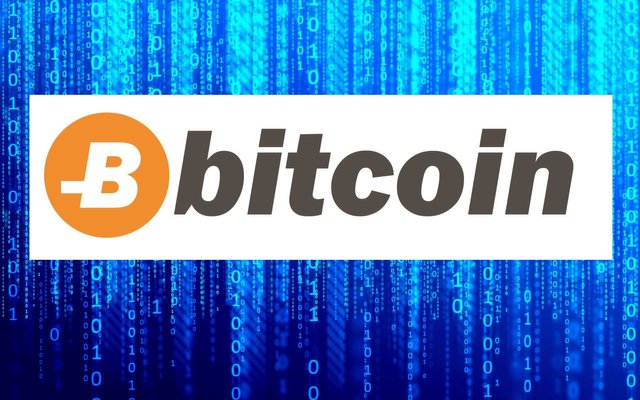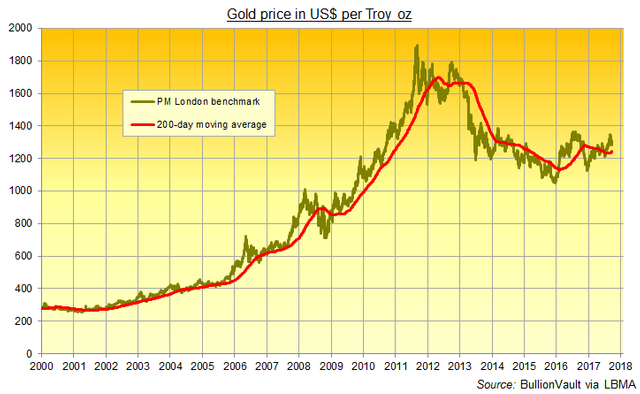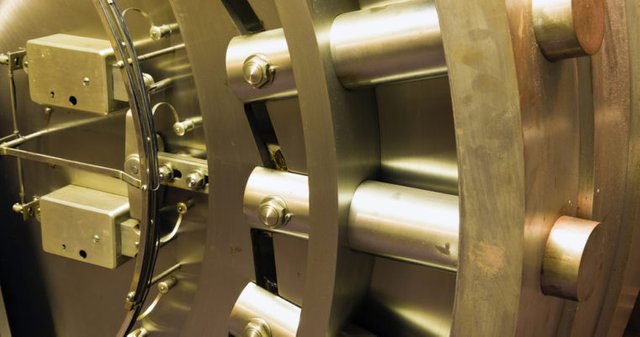Will ETFs Devalue the Price of Bitcoin?
Bitcoin ETFs are all the rage in the crypto world these days, so much so that no less than 9 ETF proposals will be reviewed by the SEC in the coming months.
But is all the hype actually justified?

For speculators, an ETF is just what Bitcoin needs to finally go mainstream and kick-start a new bull market, similar to what gold experienced after the first gold ETF (the Gold Bullion Securities) launched in 2003 on the Australian Securities Exchange).

After years of relative stability the establishment of a gold ETF indeed correlated with an almost decade-long gold bull run which came to an abrupt stop in 2013 (the year Bitcoin itself went on its first parabolic move).
If gold experienced such a boost after the establishment of an ETF, it proceeds that Bitcoin should experience the very same thing... right?
Well, not according to this woman:

Caitlin Long is a "Blockchain/bitcoin enthusiast, pension settlement expert [and] 22-year Wall Street veteran" who was recently interviewed by Trace Mayer on the Bitcoin Knowledge Podcast.
In the podcast, Caitlin argues that Bitcoin ETFs would allow Wall Street to start issuing an enormous amount of financial claims that aren't backed by actual "physical" Bitcoin (derivatives), the proliferation of which could counterbalance its digital scarcity.
Here's how this could work.
You might or might not know that SEC requires that institutional investors holding financial assets valued over $150 million USD to hold these funds into third party custody.

For the sake of the argument we will assume that these funds are bitcoins held by a certified custodian on behalf of an ETF.
Now, imagine that this custodian decides to do some fractional reserve and starts lending out some of this idle Bitcoin to other banks or exchange clearing houses via non-physical claims (off-chain derivatives). These banks then rehypothecate these claims to another layer of third parties who rehypothecate them to a another layer and so on so forth.
In principle, there is no limit to the number of un-backed layers of claims which can pile on top of an asset and any party that hold such claim is allowed to list the borrowed bitcoin as an asset on their balance sheet.
Sounds familiar? Well, in 2013 the pitfalls of fractional reserve ownership came to the forefront when shareholders in Dole Food realized that the financial system has created an excess 12 million shares in derivatives to the total number of shares in the company.

In 2017 a Delaware judge suggested blockchain as a potential solution to the problem but the reality is that (for the foreseeable future) derivatives are off-chain claims that can easily balloon on top of any asset via fractional lending then be used to suppress its price (naked shorting) or, in the case of Bitcoin, counterbalance its digital scarcity when the market becomes flooded with high-velocity IOUs and derivatives.
Already we're seeing the emergence of several crypto wallets (for example Celcius) which goal is to take custody of crypto assets then rehypothecate them to third parties in exchange for interests paid to holders.
And of course, the 1000 pound gorilla in the room: ICE's announcement of their BAKKT platform aimed at custodying crypto for institutional investors. Asset custody and rehypothecation of assets have been part of ICE's legacy business ever since its creation and, according to Long, hints that Wall Street could be about to do to Bitcoin what they've done to traditional shares.
So what say you investors? Will Wall Street win no matter what? Leave your comments!
For more on Caitlin's work I recommend this podcast:
http://www.bitcoin.kn/2018/08/caitlin-long-financialization/
and for more about Bitcoin ETFs and how they work go check out this article:
https://hackernoon.com/an-in-depth-overview-of-bitcoin-etfs-81ddaa31de06
Until next time,
FØx.
If you liked this article, make sure to show some love by up-voting or following yours truly. You can also follow me on Twitter at F0xSociety.

 Recommended Exchange:
Recommended Exchange:
Coinbase

Radar Relay
Kyber Network
 Hardware Wallet:
Hardware Wallet:
LEDGER NANO S
May the FØx be with you.
Published on

by FØx

To the question in your title, my Magic 8-Ball says:
Hi! I'm a bot, and this answer was posted automatically. Check this post out for more information.
I knew it...
Nice read. I leave an upvote for this article thumbsup
Thanks man :)
Congratulations! This post has been upvoted from the communal account, @minnowsupport, by tradealert from the Minnow Support Project. It's a witness project run by aggroed, ausbitbank, teamsteem, someguy123, neoxian, followbtcnews, and netuoso. The goal is to help Steemit grow by supporting Minnows. Please find us at the Peace, Abundance, and Liberty Network (PALnet) Discord Channel. It's a completely public and open space to all members of the Steemit community who voluntarily choose to be there.
If you would like to delegate to the Minnow Support Project you can do so by clicking on the following links: 50SP, 100SP, 250SP, 500SP, 1000SP, 5000SP.
Be sure to leave at least 50SP undelegated on your account.
Very interesting read. I still believe approval of ETF’s will send BTC skyrocketing, but this is a very interesting point of view.
Sure, I agree with you that the ETF would be certainly very bullish, I think her view is more in the long run... we'll see in 10 years I guess :D
I believe in the long run, the amount of money entering crypto (due to ETF's) will far outweigh any crash it may cause due to a lack of physical assets. Could it eventually cause a crash? Absolutely...her points are very relevant and should NOT be ignored.
That said, where will price be when it crashes...and how far will it crash? I believe 10 years from now, the sum of all gains due to ETF approval will FAR outweigh the amount lost during any type of crash. Kind of a 2 steps forward, 1 step back scenario. You're still 1 step up in the end.
Just my opinion of course. Only time will tell.
Fair points @workin2005, I can definitely agree with that.
Ha ha! They can try!
As I've said on numerous occasions, there is way too much hype about these ETFs.
I'm wary of Caitlin Long, specifically because of her "22-year Wall Street veteran" credentials. Time and time again I've seen that it is easier for a camel to pass through the eye of a needle, than for a traditional investor/trader to understand the crypto world properly and not to view it as just another Wall Street asset. Crypto rules are different!
I think that what they are forgetting is that BTC is not just another asset! Why do I say that?
That statement is cringeworthy!
BLOCKCHAIN. PRIVATE KEYS. They are not even taking into account the fundamental technology that backs crypto!
Goodbye Caitlin, I won't be reading any of your crypto opinions again!
Seriously though, this is typical old school trader mentality. It does not apply here!
Hey @bitbrain, thanks for your comment, always very opinionated :)
Cailing Long has also been in crypto since 2013-2014 so in many ways she's also a crypto veteran and her past experience as a Wall Street banker gives her some unique perspective on the uestion so I would be cautious to dismiss her on the view that she "doesn't understand crypto".
As for your second remark, I think the problem is less about where the underlying Bitcoin lives and more how many (non blockchain) claims are built on top of it, those aren't as easily traceable as let say a coin on a blockchain hence I think the possibility of derivative holders losing track but again this scenario might just not happen.
Thanks!
Yeah i get that argument about building layers on top of layers, and I see their problem. But here's the thing:
That isn't Bitcoin!
That's a traditional financial instrument that belongs firmly in the world of centralised money i.e. "the enemy".
I don't care about their ETFs or their multi-layered "wealth creation" inflationary tools. Ultimately these are the exact same devices that are already in use on other assets, and have nothing to do with Bitcoin itself. Let them not approve ETFs I don't care: Bitcoin is important, the instruments of a greedy corporate world are not.
The underlying assets will always remain traceable and that's what's important. Let their multi-layered house of cards that they build on top of BTC come tumbling down. Their non-blockchain ponzi crumbles, Bitcoin does not.
I've said this many times and I will say it many more: Bitcoin does not need fiat money. Fiat money needs Bitcoin. BTC will succeed no matter what they try.
And as for Caitlyn, she is right, but she is looking short-term and not in a holistic manner.
Thanks for the insight, time will tell I guess :)
Hello tradealert!
Congratulations! This post has been randomly Resteemed! For a chance to get more of your content resteemed join the Steem Engine Team
Regarding derivatives and other types of financial instruments based on bitcoin, that ship has sailed. Bitcoin derivatives are already available without ETFs. Banks are already contemplating how to lend off cryptocurrency deposits. Crypto hedge funds are buying up tokens and will certainly allow some of their crypto to be rehypothecated. Futures markets are already well-established. I know first-hand, I know people doing this, and from what I hear from newsletters, more and more people are doing this. Bitcoin ETF will not change that. Bakkt will not change that. Any asset that the SEC regulates, including cryptocurrency, will see speculation by professional traders and investment companies, as well as use of these assets as leverage -- whether that's cobalt or wheat or diamonds or stocks or collateralized debt obligations.
I would worry more about big blocks of institutional money buying up a scarce resource, then using their positions to manipulate the market. This is actually something the SEC has brought up multiple times when rejecting other ETFs. This is something that happens in many commodity markets and it's not fair to single out bitcoin, but, it's not necessarily the greatest thing for investors and speculators. With Bakkt, though, none of that will matter for usage and utility -- if it allows people to transact with bitcoin "on demand," as it proposes, then the vast majority of people will never need to hold bitcoin long enough for price swings to matter.
Interesting take @vdux, regarding this:
If Bitcoin becomes this high velocity asset used for payment, do you think this could lead to a devaluation of the price in the long run?
Why would it? (Not rhetorical question, honestly don't know why)
It's a complicated situation. On one hand, Bakkt will hold actual bitcoin. Bakkt stated this flat out. Theoretically the price of bitcoin should rise as more people use Bakkt, because Bakkt uses bitcoin as the payment network...as you know, there’s no way to increase supply of bitcoin to meet demand.* Rising demand, same supply, price goes up.
On the other hand, Bakkt is essentially a clearinghouse. In that role, it facilitates activities that would otherwise have occurred even if Bakkt didn't exist...Bakkt simply gives investors, traders, users, and merchants a way to coordinate their use of bitcoin and standardize the operational aspects of bitcoin transactions. If nobody wants to use bitcoin, what good is Bakkt? It's actually redundant -- it solves no operational problem with bitcoin, it solves only a problem of laziness and fear among humans who don't want to accept responsibility for managing their bitcoins, don't want to learn how to use cryptocurrency, or don't trust the bitcoin network.
From investors perspective, it’s a weird situation – do you have centralization of usage Into one or a few really big coin holders? Is there a opportunity for a few dominant holders to collude with miners to distort the market in ways that are harmful to the utility of bitcoin, it’s value as a trading asset, it’s use as a payment asset, it’s value to society...
What aspect of Bakkt would lead to devaluation of price in the long run?
*I know mining creates more bitcoins, but we all know at this point it's such a trivial amount that it doesn't really make a difference on a wholesale level.
Again, great breakdown @vdux. To answer your question.
Let's say the platform becomes very popular and attracts a lot of users but the problem of price volatility isn't solved. There is now very little incentive for merchants/users/investors to hold physical Bitcoin (custody risk + price risk) so now the underlying asset acquires high velocity because users are constantly trading in and out of it. On top of this the very few institutions that do hold Bitcoin start practicing fractional reserve lending to third parties in the form of derivatives>> in this scenario how does value accrue to Bitcoin.
PS: this is just a thought experiment, not saying this will happen :)